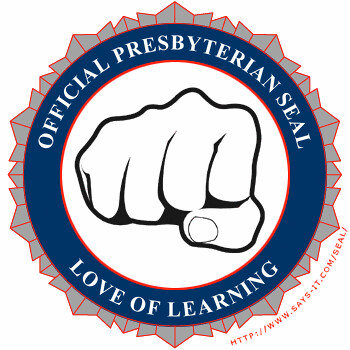
Okay, Steve has been reading a book that was published a couple of years before I went to seminary and one that was widely read as Christology books go. His observations are well worth reading. Here are some quotations he posts:
When Martinius of Bremen unwittingly proposed Christ as foundation of election on the floor of the Synod of Dort, the conservative Gomarus challenged him to a duel! … Hence, Barth’s criticisms have force from the seventeenth century on but before that time they are wide of the mark. Nevertheless, since his discussion of the question no sensible treatment of election can fail to address the en Christo dimension. In Ephesians 1:4, for instance, we should see Paul’s comments in the light of his regarding the whole of salvation, as he defines it in verses 3-14 and 2:1-10, existing in Christ (note the constant repetition of the cryptic phrases en auto, en ho or en Christo). Thus, our entire salvation is received in Christ, election included. (pg. 55)
Our union with Christ is grounded on his union with us. We can be one with him because he made himself one with us. As always, the divine comes first. Christ’s union with us took place in his incarnation. (pg. 77)
The birth of Jesus thus marks a new creation, a new beginning, equally due to the creative energies of God… In becoming man, Christ united himself with the human race… At the same time, he marked a new beginning for the race. (pg. 79)
Justification, sanctification, adoption and glorification are all received through our being united to Christ. (pg. 80)
Where union with Christ surfaces in our experience, repentance and faith are always present. In that sense, without repentance and faith, union with Christ does not exist. (pg 81)
Union with Christ exists in faith but it is also connected in the New Testament with baptism. One reason for this is that baptism marks the start of the Christian life. In the New Testament baptism was administered at the point at which a person was regarded as a Christian. (pg. 81)
Hence, to separate election from union with Christ, as both Hodge and Berkhof did in their volumes of systematic theology, is a departure from the perspective of Scripture… The problem for both Hodge and Berkhof stemmed from the loss of a christocentric doctrine of election in Reformed theology. (pg. 86)
 Steve makes some startling observations in addition to these quotations, but I will invite you to read them on his blog. My point is simply to add my testimony for those too young our out of the loop to know it for themselves.
Steve makes some startling observations in addition to these quotations, but I will invite you to read them on his blog. My point is simply to add my testimony for those too young our out of the loop to know it for themselves.
When I went to seminary, Letham’s book had all the buzz. It was considered the best recent book on that aspect of theology with a lot of great insight to offer. No one considered it subversive or requiring refutation. No one claimed Reformed theology was under attack.
No one claimed the book was revolutionary either; Letham simply solidified thinking that had been going on for years in conservative Evangelical circles.